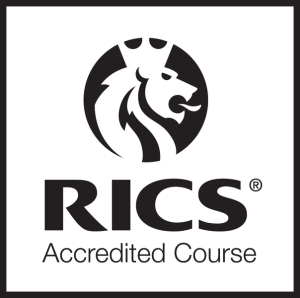
Key information
For:
starting September 2026
Accreditation:
This course is Accredited
Typical offer:
112-120 UCAS points from 2 or 3 A levels, or equivalent
Showing content for section Overview
Overview
Build your future with a professional degree that you study alongside your job. You’ll learn to handle the issues that inform decisions in building management, such as development costs, the viability of repairs, building law and property economics.
This is a degree apprenticeship course, so you’ll spend 1 day of your working week on your studies, with the other 4 in your current job. You’ll be able to put what you learn to work immediately, developing your career as you contribute to the success of your company. And your fees are covered by your employer, or the Government, so you won’t face any tuition costs.
I previously found it hard to balance college work during the day and part-time retail work in the evenings, so the degree apprenticeship is a perfect way to earn whilst I learn. My responsibilities at work have given me experience I can apply in the learning environment as well as confidence, which helps with assessments such as presentations.
Course highlights
- Work toward Chartered Surveyor status, with the skills you'll need for registration embedded in your studies
- Use laboratory and test house facilities where you’ll study material performance, surveying and Building Information Modelling (BIM) techniques
- Explore projects such as the Passivhaus standard housing development and The National Self Building and Renovation Centre
- Apply practical surveying skills on site in real buildings, and learn from practising building surveyors and guest speakers
- Have access to the University's student support services and community including the Library, study support, sports and recreation facilities, and the Students’ Union
- Build a network of professional peers and fellow students from other surveying and civil engineering disciplines
- Study alongside your job, with support from a personal University tutor and a workplace mentor
You'll typically go to university one day a week for around 30 weeks every year to attend lectures, seminars and workshops. On the weeks you don't go to University, you'll still spend at least six hours per week studying or training away from your normal working environment.
Accreditation
This degree is accredited by the Royal Institution of Chartered Surveyors (RICS), so what you learn on the course applies to the industry.
When you graduate, you'll have the academic and work-based experience that you need to register for the RICS Assessment of Professional Competence (APC). Upon passing the APC, you will be a Chartered Surveyor.
This gives you an edge over students who didn’t do an accredited course when you’re applying for jobs in the future.
I'm an employer interested in this degree apprenticeship for my staff
There's more information for you about degree apprenticeships on our information for employers page, or you can contact us directly.
If you have an employee, or employees, in mind, that's great; if you are creating a new opening, we can help you shape and promote the role.
Contact information
Contact Degree ApprenticeshipsEntry requirements
BSc (Hons) Building Surveying (Degree Apprenticeship) entry requirements
Typical offers
- UCAS points - 112-120 points from 2 or 3 A levels, or equivalent.
- A levels - BBB-BBC
- T-levels - Merit
- BTECs (Extended Diplomas) - DDM-DMM
- International Baccalaureate - 29
Applicants aged 16-18 must have acceptable Level 2 qualifications in English and Maths, such as GCSE with grade C/4 or above or Functional Skills. If you do not have acceptable qualifications, you will be required to obtain this. Those aged 19 and over are only subject to these requirements if you or your employer choose for you to study towards English and Maths qualifications, which will be funded. Please note that you may still be required to evidence accepted Level 2 qualifications for the course, as part of academic assessment.
Selection process
- All applicants will be required to complete a Skills Gap Analysis before completing an application form.
- All applicants will be invited to attend an academic interview and may be asked to submit a portfolio of work or undertake additional assessment.
You may need to have studied specific subjects – find full entry requirements and other qualifications we accept.
We look at more than just your grades
While we consider your grades when making an offer, we also carefully look at your circumstances and other factors to assess your potential. These include whether you live and work in the region and your personal and family circumstances which we assess using established data.
You and your employer
When you begin studying for your degree apprenticeship:
- You need to be 18 or over
- You should be able to satisfy government requirements on residency:
- you must be a citizen or have the right to live in the UK/EEA
- you must have been a resident in the UK/EEA (not the Channel Islands or Isle of Man) for a minimum of 3 years
- you must not need a Student Route visa, and must not have been on a Student Route visa within the past 3 years
- You need to have the right to work in the UK, and to spend at least 50% of your working hours in England
- Your job should meet the requirements of the apprenticeship standard relevant to this degree – we can advise you and your employer on this
- Your employer needs to have registered an apprentice service account – we can help your employer with this if needed
If you aren't currently working in a relevant field, you can apply for a job and degree apprenticeship simultaneously. Read more about applying for this degree apprenticeship.
Your facilities

Port-Eco House
Our Port-Eco House is a 3-bedroom property equipped with various monitoring systems, which measure everything from the efficiency of heating and insulation to dampness and exterior weather conditions.

Concrete laboratory
Design, mix and test different concrete mixes, and observe and record all stages of the concrete production process via a built-in camera system and live stream in this lab.

Building Information Modelling (BIM) software
Use our suite of Building Information Modelling (BIM) software, including our computer-aided design tools that use digital images to show physical and functional characteristics.
Careers and opportunities
When you successfully complete your apprenticeship, you'll be a registered Chartered Surveyor.
You'll also have gained the professional knowledge and practical experience you need to advance your career in the building sector as a building surveyor, and you'll be able to show the skills and qualifications you need to be an ideal candidate for project and facilities management roles in your organisation and beyond.
You could also choose to set up your own business, or take a voluntary placement.

Ongoing career support – up to 5 years after you graduate
Get experience while you study, with support to find part-time jobs, volunteering opportunities, and work experience.
Towards the end of your degree and for up to five years after graduation, you’ll receive one-to-one support from our Careers and Employability Service to help you find your perfect role.
Modules
What you'll study
Modules studied
You'll examine construction principles for residential and commercial projects, analysing material use and building regulations. Through discussion and case studies, you'll reflect on strategies like renewable energy, water efficiency, and waste management. You'll consider sustainability's significance in property design, development, and management. Ultimately, be ready to explain building concepts and environmental issues, and to select appropriate strategies to create sustainable, environmentally-conscious designs.
You'll mix concrete to meet building requirements, explore the behaviour and strengths of metal, timber and masonry in our materials labs, and report on your experimental findings.
Modules studied
Through theory and case studies, you'll develop skills to plan, monitor, and control projects while considering technical and human factors. You'll use industry-standard techniques like WBS and CPM to create organizational structures, schedules, budgets, and risk management plans, covering the project cycle from initiation and stakeholder engagement to procurement and sustainability integration. With individual and group assignments, you'll apply your learning to demonstrate effective project planning, teamwork, and communication. By the end, you'll have core competencies and techniques to successfully manage construction projects.
Modules studied
You'll set out the stages of a scheme design, with reference to the RIBA Plan of Work, and learn to assess and recommend procurement routes throughout the project lifecycle. You'll also analyse the property market, evaluate risk in procurement approaches, and apply economic insight to the construction industry. On completion of this module, you will know how to guide project inception and set your clients on the path to success.
You'll learn to work within development procedures, enforcement tradeoffs, decision appeals, rural-urban issues, and the complexities of professional conduct in high-impact property planning.
You'll evaluate industry fragmentation in a major project, and see how BIM can provide integration across disciplines. Moving beyond 2D, you'll model projects in 3D for deeper insights. Collaborating securely in teams, you'll use BIM standards to complete virtual buildings.
Integrating technical, economic and design considerations, you'll progress through the project lifecycle, honing professional communication techniques. You'll also evaluate your personal development options and build your portfolio of project experience and industry connections, as you complete a project that demonstrates your professional abilities.
Modules studied
You'll understand how faults impact occupants, evaluate reporting methods and recommend solutions that balance repair costs and heritage value. As you develop a holistic view of buildings, considering technical and social factors, you'll gain confidence in recommending improvements to buildings that positively impact communities.
In this module, you'll analyse environmental best practices in real estate. You'll hone your critical and reflective understanding, empowering you to creatively confront efficiency, conservation, and resilience issues facing the built environment.
Modules studied
Changes to course content
We use the best and most current research and professional practice alongside feedback from our students to make sure course content is relevant to your future career or further studies.
Therefore, some course content may change over time to reflect changes in the discipline or industry. If a module doesn't run, we'll let you know as soon as possible and help you choose an alternative module.
Teaching
Teaching
Teaching methods on this course include:
- lectures
- seminars
- computer-based tutorials
- laboratories
- workshops
You'll keep regular contact with your mentor, especially during your work-based learning project in the final year.
You can also use many of the facilities and get support from Faculty staff in the evenings and weekends.
How you're assessed
You'll be assessed through:
- closed and open book exams
- problem-based coursework and professional style reports
- computer-based portfolios
- group presentations
- major work-based project
You’ll be able to test your skills and knowledge informally before you do assessments that count towards your final mark.
You can get feedback on all practice and formal assessments so you can improve in the future.
How you'll spend your time
How you study for your degree will depend on your employer. You'll likely attend the University on day release for 1 day every week during term time. You'll do follow-up work by yourself when away from the University with support from our Virtual Learning Environment: Moodle.
Term dates
The academic year runs from September to June. There are breaks at Christmas and Easter.
Supporting you
The amount of timetabled teaching you'll get on your degree might be less than what you're used to at school or college, but you'll also get support via video, phone and face-to-face from teaching and support staff to enhance your learning experience and help you succeed. You can build your personalised network of support from the following people and services:
Types of support
Your personal tutor helps you make the transition to independent study and gives you academic and personal support throughout your time at university.
As well as regular scheduled meetings with your personal tutor, they're also available at set times during the week if you want to chat with them about anything that can't wait until your next meeting.
You'll get a workplace mentor who's there to support you during your apprenticeship. They'll understand your workplace responsibilities and help you to balance your workload in your workplace and in your studies
You'll have help from a team of faculty learning support tutors. They can help you improve and develop your academic skills and support you in any area of your study in one-on-one and group sessions.
They can help you:
- master the mathematics skills you need to excel on your course
- understand engineering principles and how to apply them in any engineering discipline
- solve computing problems relevant to your course
- develop your knowledge of computer programming concepts and methods relevant to your course
- understand and use assignment feedback
All our labs and practical spaces are staffed by qualified laboratory support staff. They’ll support you in scheduled lab sessions and can give you one-to-one help when you do practical research projects.
During term time, Faculty Academic Skills Tutors (AST) are available for bookable 1-to-1 sessions, small group sessions and online sessions. These sessions are tailored to your needs.
Support is available for skills including:
- University study
- Getting into the right study mindset
- Note-taking and note-making skills
- Referencing
- Presentation skills
- Time management, planning, and goal setting
- Critical thinking
- Avoiding plagiarism
If you have a disability or need extra support, our Disability Advice team will give you help, support and advice.
You can get personal, emotional and mental health support from Student Wellbeing, in person and online. This includes 1–2–1 support as well as courses and workshops that help you better manage stress, anxiety or depression.
If you require extra support because of a disability or additional learning need our specialist team can help you.
They'll help you to
- discuss and agree on reasonable adjustments
- liaise with other University services and facilities, such as the library
- access specialist study skills and strategies tutors, and assistive technology tutors, on a 1-to-1 basis or in groups
- liaise with external services
Library staff are available in person or by email, phone, or online chat to help you make the most of the University’s library resources. You can also request one-to-one appointments and get support from a librarian who specialises in your subject area.
The library is open 24 hours a day, every day, in term time.
The Maths Cafe offers advice and assistance with mathematical skills in a friendly, informal environment. You can come to our daily drop-in sessions, develop your mathematics skills at a workshop or use our online resources.
If English isn't your first language, you can do one of our English language courses to improve your written and spoken English language skills before starting your degree. Once you're here, you can take part in our free In-Sessional English (ISE) programme to improve your English further.
Costs and funding
Tuition fees
The course fee is shared between the Government and some employers, meaning no cost to you as the degree apprentice. Total tuition fees are £27,000 paid over five years.
Please see our Degree Apprenticeships page for further information.
Additional course costs
These course-related costs aren’t included in the tuition fees. So you’ll need to budget for them when you plan your spending.
Additional costs
Our accommodation section show your accommodation options and highlight how much it costs to live in Portsmouth.
You’ll study up to 6 modules a year. You may have to read several recommended books or textbooks for each module.
You can borrow most of these from the Library. If you buy these, they may cost up to £60 each.
We recommend that you budget around £40 a year for photocopying, printing charges, binding and specialist printing - while we try to keep files and content electronic, there may be some paper and printing to be undertaken.
If your final year includes a major project, there could be cost for transport or accommodation related to your research activities. The amount will depend on the project you choose.
We will provide you with hard hats and Hi-Vis vests. You will need to buy your own safety boots costing approximately £35.
Employers must also appoint an RICS Counsellor to support and work with the Apprentice until the end of the Apprenticeship Programme. The Employer is responsible for all costs and expenses associated with this.
An RICS Counsellor is an RICS chartered professional (MRICS or FRICS) who agrees to act in accordance with MRICS Assessment Counsellor's Guide.
How to apply
The application deadline to start in September 2026 is to be confirmed by the Degree Apprenticeships team.
Applications received after this date may not be considered.
I'm applying with my current employer
If you're already in full-time work, and your employer is interested in you studying this course, get them to contact us and we'll work out how to work together.
If your employer isn't interested yet, you might find it useful to share our information for employers page with them.
Employer contact form Information for employers
I'm looking for a job with a Degree Apprenticeship role
If you're not in full-time employment, or your current employer is not interested in degree apprenticeships, you'll need to find a role that does offer a degree apprenticeship. You can search the gov.uk list of open degree apprenticeship vacancies, or contact us with your details and we'll let you know when degree apprenticeship vacancies come up.
When you apply for a role that includes one of our degree apprenticeships, you'll follow the company's standard recruitment process for the job, while we assess your academic suitability for the course.
Admissions terms and conditions
When you accept an offer to study at the University of Portsmouth, you also agree to abide by our Student Contract (which includes the University's relevant policies, rules and regulations). You should read and consider these before you apply.


